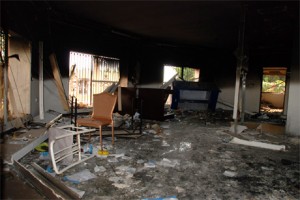
Inside the U.S. consulate in Benghazi the morning after the attack that killed four Americans, including Ambassador Chris Stevens, Wednesday, Sept. 12, 2012. Photo: AP Photo/Ibrahim Alaguri
Cross-posted from Joshua Foust’s regular column with PBS Need to Know.
Last month, four Americans (including one U.S. Ambassador) were killed in a terrorist attack on the American consulate in Benghazi, Libya. While the death of an ambassador is always monumental – Chris Stevens is the first ambassador killed in the line of duty since Adolph Dubs was murdered by extremists in Afghanistan in 1979 – the degree to which the blame-shifting has improperly focused on the intelligence community (IC) is nothing short of astonishing.
The rancor seems to be driven by the response of both President Obama and candidate Romney in the days immediately proceeding the assault. In short, both sides – Republicans and Democrats – were wrong to have focused so intently on the role an anti-Muslim film may have played in the initial embassy protest.
We now know that the assault on the embassy was not a spontaneous explosion of anger, but a deliberate assault by a group widely believed to be affiliated in some way with al Qaeda. The IC is now absorbing the blame for the public misconception about the attack. President Obama was briefed by the CIA each morning for the first week proceeding that the attack was a spontaneous protest. It has since come to light that a CIA cable suggested otherwise immediately after the assault and administration critics have publicly accused the President of concealing information about the attack. Even some administration officials have placed blame on the intelligence community itself for not being clear enough about what happened.
The problem with this after-the-fact treatment of information is that it ignores how difficult solid reporting is to get from complex, high-profile events. Raw intelligence – firsthand accounts, video surveillance, and other forms of data – rarely adds up to a coherent picture straight away. I worked as an analyst in the intelligence community for many years, and more often than not reports are contradictory, misleading, and paradoxical. It takes time, deliberation, and a great deal of patience to sift through available information and to then arrive at what probably happened. In the meantime, members of the intelligence community make their best guess about what likely occurred and try to improve on their theory as more information comes in. Intelligence, sadly, is not perfect.
Journalists have reported on what they knew about the Benghazi assault since it happened, and the media’s account has evolved as more access to information has been gained. This is how journalism works – you get a better picture with more data and time to understand that data. But when the intelligence community goes through the exact same process – updating their view of what happened as more data comes in and de-conflicting incompatible accounts – they get hammered for either concealing or improperly predicting an unpredictable event.
The consequences of this improper blame to policymakers can be dire. Since the timeline of the Benghazi assault and its supposed intelligence “failure” is a politically charged issue now, different intelligence agencies are reportedly fighting amongst themselves over who gets to tell the ‘corrected’ story. This type of distraction not only slows down the vital process of determining exactly what happened, it creates a dangerous precedent for the future.
Imagine you’re an agency head and you get a vaguely worded piece of intelligence suggesting something bad might happen at a diplomatic outpost in, say, Nigeria. Under normal circumstances this data would be marked according to its reliability (which is how likely a collector or analyst believes it to be true), and placed alongside other reports about that same outpost. These other reports might not agree with each other. So in the final analysis, you’re left with a list of different outcomes to plan for, and if you’re really lucky you can order them by likelihood. From everything we know, this is exactly what happened in Benghazi and immediately afterward.
But now the partisan knife fight has happened. One side is accusing your boss of hiding what happened, and the other side is saying it’s your fault for not knowing it sooner. How does this change the intelligence process?
That agency head is going to be less likely to caveat information conservatively. She will be much more likely to present all possible threats as likely threats, demanding an impossible level of preparedness to make sure her agency can avoid public opprobrium. Therefore, standards will be raised that the IC should be able to predict things, or have perfect knowledge of events, even when this is impossible.
In other words, the IC would cease to function as it should; policymakers’ ability to understand the world in a nuanced way will suffer. This in turn could possibly lead to worse policy decisions in the future.
There is a broad sense within the intelligence community that something is changing in the Middle East, and everyone – including the American public– is worried about what it will be. While the role of the intelligence community and foreign policy more broadly should be debated publicly, the current discussion is counterproductive and quickly moving away from facts. Americans deserve better.


